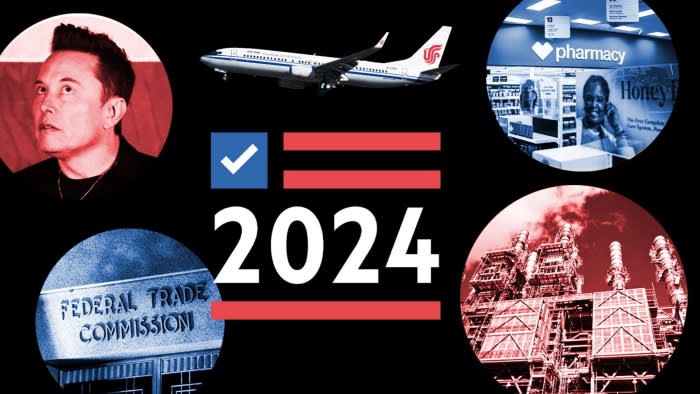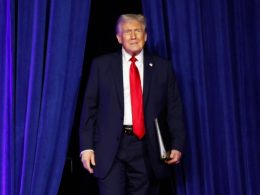Beyond their headline policies on taxes, regulation and tariffs, Kamala Harris and Donald Trump have set out plans that could have profound effects on different corners of corporate America.
Here is an overview of which sectors and companies have the most to win or lose depending on who emerges victorious from the November 5 polls.
Energy
A Trump victory could boost the oil and gas sector. The Republican candidate has pledged to “unleash American energy” by rescinding “every one of Joe Biden’s industry-killing regulations”.
The former president plans to lift the pause on approving new liquefied natural gas terminals, slash regulations on greenhouse gas emissions and gut incentives and targets aimed at encouraging the rollout of electric vehicles and renewables.
Congress and the courts could slow his progress, but a Trump presidency may have serious implications for certain sectors, such as offshore wind, which rely on federal approvals.
Oil and gas production, however, which is at record levels, is unlikely to change in the short term because there are few policy constraints on onshore shale production and investors are reluctant to support expensive new drilling campaigns.
A Harris victory would continue the Biden administration’s policies of incentivising the rollout of renewables while facilitating fossil fuels production to enable the US to remain the world’s largest producer.
Under Harris the Inflation Reduction Act, President Biden’s flagship climate law, which provided incentives that encouraged almost $450bn in investment to flow into green energy, would be safe. Trump, however, has pledged to rip up the law.
Both candidates are expected to support the rollout of nuclear energy, one of the few areas of bipartisan agreement in the sector.
Harris would not seek to impose punitive tariffs on imports — a Trump policy that energy executives fear could upend world trade and, in turn, hit their business.
Tech
Either US presidential candidate could frustrate Silicon Valley’s obsession with artificial intelligence.
Trump has promised to cancel Biden’s executive order on AI, which Harris helped launch a year ago. That would satisfy not just Elon Musk, who has backed Trump to avoid “strangulation by overregulation” and is lined up for a government role focused on improving “efficiency”, but also start-up investors such as Marc Andreessen, who believe stricter rules would stifle the country’s AI race against China and entrench Big Tech’s dominance.
However, Trump’s stance on Taiwan, which he has accused of stealing the US semiconductor industry, poses significant challenges for AI chipmaker Nvidia and its customers in Silicon Valley. Nvidia — similar to Apple — relies on Taiwan Semiconductor Manufacturing Company to produce its cutting-edge chips. New tariffs on Taiwanese imports could raise the costs or disrupt the supply of AI chips, which is already far outstripped by demand. Apple and Nvidia would also suffer if Trump imposes higher tariffs on imports from China, where they have extensive supply chains.
Harris’s life-long ties to California, and continuity with the Biden administration’s investment in US broadband infrastructure and semiconductor manufacturing, make her a more natural ally to the tech industry. Her more pro-immigration policies would sustain the flow of global talent that has helped Silicon Valley thrive. Yet her focus on the risks of AI could erect different kinds of barriers.
Banking and Finance
US banks spent more than a year of Biden’s presidency successfully batting back a proposal for higher capital requirements. A Trump victory could further embolden the industry to seek an even more favourable deal than the one the Federal Reserve recently outlined.
Dealmakers on Wall Street also hope Trump would soften the aggressive stance to antitrust under Federal Trade Commission chair Lina Khan and Jonathan Kanter at the Department of Justice. While Trump’s running mate JD Vance has raged against US companies’ anti-competitive behaviour, how he would influence the ex-president’s approach remains unclear.
A second Trump administration may also roll back the Securities and Exchange Commission’s push for more disclosure in areas such as private capital and climate risks.
However, a Trump administration might seek to limit the ability of banks and asset managers to use environmental, social and governance factors in their investment decisions and crack down on diversity programmes, which would bring different problems for Wall Street. On the campaign trail Trump has also talked about capping credit card interest rates at about 10 per cent, a move banks would oppose.
Harris has sought to convince wealthy donors that her administration would be less aggressive on constraining big business than Biden’s. This could include appointing new officials to the SEC and the FTC who would take a less aggressive stance than Gary Gensler and Khan, respectively.
If Harris does seek to replace Khan, she will face resistance from some on her party’s leftwing. Alexandria Ocasio-Cortez has warned of an “out and out brawl” if Khan were to be removed from her post.
Joshua Franklin and Brooke Masters
Consumer goods
If Harris wins, food and drink groups in the US could face heightened scrutiny of their pricing strategies: She has vowed to introduce a federal ban on price gouging by food and drink companies within her first 100 days in office.
Harris’s administration would also curb mergers and acquisitions seen as hurting competition, and boost support for small businesses. Dealmaking in the sector, which had ground to a halt over the past few years as borrowing costs rose, has bounced back recently with large deals including Mars’s $36bn purchase of Pringles maker Kellanova.
Trump has pledged to lower grocery prices for Americans with his plans to impose sweeping tariffs on imports. However, economists have noted the policy would probably yield the opposite outcome.
Tariffs on imports of commodities including grains and sugar would drive up the price of those materials, which food and drinks manufacturers will then seek to pass on to consumers to protect their margins.
In all, US consumers could lose between $46bn and $78bn in spending power a year if Trump’s proposed tariffs were implemented, the National Retail Federation estimated on Monday.
Aviation
A Trump victory could be bad news for the aviation industry, hurting Boeing’s chances of securing more aircraft sales in China while making planes more expensive for US airlines.
The Republican candidate has threatened to impose a 60 per cent tariff on goods from China and at least a 10 per cent levy on all other imports.
Chinese airlines are big customers for Boeing, which could strike back with retaliatory tariffs. This could hurt the US aircraft maker at a sensitive time for the group, which is struggling to recover from quality problems and a damaging strike.
“Boeing hasn’t had a new aircraft order from China for some time, and Trump would extend their drought,” said Robert Stallard, analyst at Vertical Research Partners.
If applied to aircraft, Trump’s tariffs could also have a knock-on effect on US airline customers of Boeing’s biggest rival. Airbus jets delivered to US carriers or imported components used by the European plane maker to assemble its A320neo and A220 aircraft at its site in Mobile, Alabama, could be affected.
Guillaume Faury, Airbus chief executive, last week said the costs of any new tariffs would be passed along to customers, similarly to what happened in 2020 when Trump’s previous administration levied duties as part of a long-running dispute with Europe over aircraft subsidies.
“It would put [our customers] in a difficult place of adding an additional cost on what they have ordered and what they’re procuring,” he said.
Analysts said Airbus could manage to secure exemptions for its products. The last time “Airbus found ways to manage the tariff situation, and it only impacted the A350 as the A320 is made in the USA”, Stallard said. US airlines, however, “were not happy”.
A Harris victory is unlikely to have such a disruptive impact as she is expected to continue with the Biden administration’s policies.
Cars
A Trump administration could hurt the struggling US market for electric vehicles, which comprised about 9 per cent of the country’s new car sales in the third quarter. The former president has said regulations on emissions will “kill” the industry and must be eliminated, which would diminish legacy carmakers’ incentive to develop EVs. He is also expected to end the $7,500 tax credit Biden introduced on eligible EVs.
The wild card when it comes to Trump’s EV stance is the support from Musk, chief executive of Tesla. The tech billionaire has been promoting the ex-president on his social media site X and has donated at least $75mn, prompting Trump to recently back off his criticism of EVs, saying “Elon Musk is a very good friend of mine”.
Trump is not friends with Shawn Fain, the United Automobile Workers president who called Trump a scab in August after the former president and Musk publicly discussed how companies should be able to illegally fire striking workers. The union has endorsed Harris for the presidency, bolstering Democratic voter turnout efforts in the swing state of Michigan.
Healthcare and pharmaceuticals
During his first term, Trump tried and failed to repeal the Affordable Care Act, known as Obamacare, which made it illegal to deny care to people with pre-existing conditions. He has been less categorical about his proposals should he return to the White House.
During the presidential debate against Harris in September, Trump said he had “concepts of a plan” to replace the ACA but declined to explain further. Any such changes would mean a significant upheaval for the 45mn patients relying on the law and their private health insurance plans.
Harris has played up the prospects of Trump repealing the ACA, telling reporters that “healthcare for all Americans is on the line in this election” after a campaign event in Madison, Wisconsin, last week.
Harris has also vowed to widen the reach of drug pricing controls for Medicare, the state-backed health insurance programme for Americans over 65, which were introduced as part of Biden’s IRA climate law. She could do so by increasing the number of eligible medicines and extending the programme to private insurers, but such changes would require the approval of Congress.
Trump, who was hawkish on drug prices when president, has been less clear about whether he would change Medicare price controls.
Harris has also proposed to extend a $35-a-month cap on insulin prices for diabetics on Medicare to all patients, including those on private health insurance plans.
Source link










